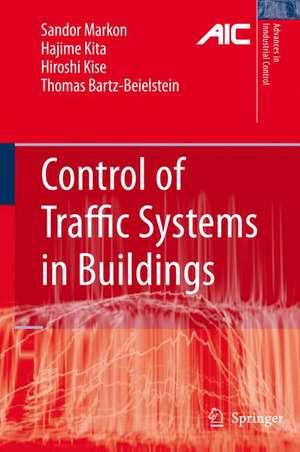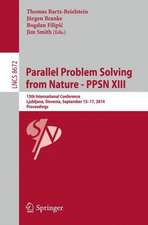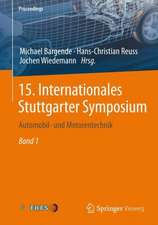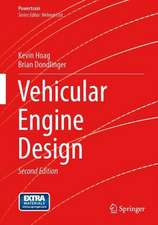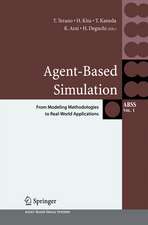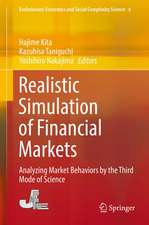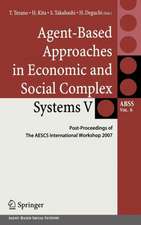Control of Traffic Systems in Buildings: Advances in Industrial Control
Autor Sandor A. Markon, Hajime Kita, Hiroshi Kise, Thomas Bartz-Beielsteinen Limba Engleză Hardback – 7 iul 2006
Workers in elevator control have pioneered the development of many modern control systems for use in all sorts of traffic and scheduled systems so this exposition of recent work in in-building transport control will be of interest to researchers and engineers in many areas of control, particularly in optimal or supervisory control, urban transportation systems and intelligent transport systems.
| Toate formatele și edițiile | Preț | Express |
|---|---|---|
| Paperback (1) | 640.71 lei 6-8 săpt. | |
| SPRINGER LONDON – 21 oct 2010 | 640.71 lei 6-8 săpt. | |
| Hardback (1) | 647.08 lei 6-8 săpt. | |
| SPRINGER LONDON – 7 iul 2006 | 647.08 lei 6-8 săpt. |
Din seria Advances in Industrial Control
- 15%
 Preț: 643.34 lei
Preț: 643.34 lei - 23%
 Preț: 582.63 lei
Preț: 582.63 lei - 18%
 Preț: 783.98 lei
Preț: 783.98 lei - 18%
 Preț: 947.35 lei
Preț: 947.35 lei - 20%
 Preț: 568.24 lei
Preț: 568.24 lei - 15%
 Preț: 643.16 lei
Preț: 643.16 lei - 18%
 Preț: 899.21 lei
Preț: 899.21 lei - 18%
 Preț: 891.33 lei
Preț: 891.33 lei - 18%
 Preț: 740.57 lei
Preț: 740.57 lei - 18%
 Preț: 961.23 lei
Preț: 961.23 lei - 18%
 Preț: 955.08 lei
Preț: 955.08 lei - 15%
 Preț: 645.28 lei
Preț: 645.28 lei - 15%
 Preț: 638.43 lei
Preț: 638.43 lei - 18%
 Preț: 901.11 lei
Preț: 901.11 lei - 18%
 Preț: 1410.94 lei
Preț: 1410.94 lei - 18%
 Preț: 728.91 lei
Preț: 728.91 lei - 20%
 Preț: 1003.78 lei
Preț: 1003.78 lei - 18%
 Preț: 947.35 lei
Preț: 947.35 lei - 15%
 Preț: 643.34 lei
Preț: 643.34 lei - 15%
 Preț: 654.30 lei
Preț: 654.30 lei - 18%
 Preț: 950.52 lei
Preț: 950.52 lei - 15%
 Preț: 644.30 lei
Preț: 644.30 lei - 18%
 Preț: 1393.09 lei
Preț: 1393.09 lei - 18%
 Preț: 950.21 lei
Preț: 950.21 lei - 18%
 Preț: 949.90 lei
Preț: 949.90 lei - 18%
 Preț: 949.42 lei
Preț: 949.42 lei - 18%
 Preț: 950.52 lei
Preț: 950.52 lei - 18%
 Preț: 1113.71 lei
Preț: 1113.71 lei - 15%
 Preț: 650.04 lei
Preț: 650.04 lei - 15%
 Preț: 644.95 lei
Preț: 644.95 lei - 18%
 Preț: 950.33 lei
Preț: 950.33 lei - 18%
 Preț: 948.61 lei
Preț: 948.61 lei - 18%
 Preț: 1112.60 lei
Preț: 1112.60 lei - 15%
 Preț: 644.63 lei
Preț: 644.63 lei - 18%
 Preț: 953.20 lei
Preț: 953.20 lei - 18%
 Preț: 945.62 lei
Preț: 945.62 lei - 15%
 Preț: 640.88 lei
Preț: 640.88 lei - 15%
 Preț: 640.88 lei
Preț: 640.88 lei - 20%
 Preț: 650.92 lei
Preț: 650.92 lei - 18%
 Preț: 1112.60 lei
Preț: 1112.60 lei - 20%
 Preț: 998.36 lei
Preț: 998.36 lei - 15%
 Preț: 643.34 lei
Preț: 643.34 lei - 18%
 Preț: 948.92 lei
Preț: 948.92 lei - 18%
 Preț: 1381.43 lei
Preț: 1381.43 lei - 15%
 Preț: 651.51 lei
Preț: 651.51 lei - 20%
 Preț: 563.66 lei
Preț: 563.66 lei - 18%
 Preț: 992.64 lei
Preț: 992.64 lei - 18%
 Preț: 1225.79 lei
Preț: 1225.79 lei
Preț: 647.08 lei
Preț vechi: 761.27 lei
-15% Nou
Puncte Express: 971
Preț estimativ în valută:
123.84€ • 128.81$ • 102.23£
123.84€ • 128.81$ • 102.23£
Carte tipărită la comandă
Livrare economică 14-28 aprilie
Preluare comenzi: 021 569.72.76
Specificații
ISBN-13: 9781846284489
ISBN-10: 1846284481
Pagini: 302
Ilustrații: XXII, 280 p. With online files/update.
Dimensiuni: 155 x 235 x 22 mm
Greutate: 0.6 kg
Ediția:2006
Editura: SPRINGER LONDON
Colecția Springer
Seria Advances in Industrial Control
Locul publicării:London, United Kingdom
ISBN-10: 1846284481
Pagini: 302
Ilustrații: XXII, 280 p. With online files/update.
Dimensiuni: 155 x 235 x 22 mm
Greutate: 0.6 kg
Ediția:2006
Editura: SPRINGER LONDON
Colecția Springer
Seria Advances in Industrial Control
Locul publicării:London, United Kingdom
Public țintă
ResearchCuprins
Transportation Systems.- Passenger Transportation Systems.- Cargo Transportation Systems.- External Connections and Related Systems.- Modeling and Simulation.- General Modeling Concepts.- Queuing Models.- Modeling Techniques for Discrete Event Systems.- Scheduling Models with Transportation.- Intelligent Control Methods for Transportation Systems.- Analytical and Heuristic Control of Transportation Systems.- Adaptive Control by Neural Networks and Reinforcement Learning.- Genetic Algorithms for Control-system Optimization.- Control System Optimization by Evolution Strategies and Particle Swarm Optimization.- Intelligent Control by Combinatorial Optimization.- Topics in Modern Control for Transportation Systems.- The S-ring: a Transportation System Model for Benchmarking.- Elevator Group Control by Neural Networks and Stochastic Approximation.- Optimal Control by Evolution Strategies and Particle Swarm Optimization.- On Adaptive Cooperation of AGVs and Elevators in Buildings.- Optimal Control of Multicar Elevator Systems by Genetic Algorithms.- Analysis and Optimization for Automated Vehicle Routing.- Tabu-based Optimization for Input/Output Scheduling.
Notă biografică
Sandor Markon has 25 years experience as a designer, researcher and manager dealing with control systems with major elevator manufacturers. He is also active in publishing papers and abstracts in related fields. He has been involved in the installation of four generations of elevator systems in buildings world-wide. The current volume would gathers that knowledge together with that of other researchers currently scattered in short articles, patent disclosures, etc., into one place.
Textul de pe ultima copertă
Transportation systems in buildings are part of everyday life: whether ferrying people twenty storeys up to the office or moving luggage to the airport check-in, 21st-century man relies on them.
Control of Traffic Systems in Buildings presents the state of the art in the analysis and control of transportation systems in buildings focusing primarily on elevator groups. The theory and design of passenger traffic and cargo transport systems are covered, together with actual operational examples and topics of special current interest such as:
• noisy, on-line and algorithmic optimization;
• simulation-based modeling of passengers and goods;
• control of cooperative agent-oriented systems;
• proposal for a benchmark to compare new control methods;
• deployment and testing of transportation systems.
Special attention is given to the techniques and uses of simulation and a working simulator is included that allows readers to explore the subject for themselves.
The safe running of such automated traffic systems, though vital, gets rather taken for granted but workers in elevator control have pioneered the development of many modern control systems for employment in all sorts of traffic and scheduled systems being among the first to realize the potential of techniques like fuzzy logic, neural networks and genetic algorithms. For this reason, this exposition of recent work in in-building transport control will be of considerable interest to researchers and engineers in many areas of control, particularly those working in optimal or supervisory control, urban transportation systems and intelligent transport systems as well as to those directly interested in the elevator control systems under discussion.
Advances in Industrial Control aims to report and encourage the transfer of technology in control engineering. The rapid developmentof control technology has an impact on all areas of the control discipline. The series offers an opportunity for researchers to present an extended exposition of new work in all aspects of industrial control.
Control of Traffic Systems in Buildings presents the state of the art in the analysis and control of transportation systems in buildings focusing primarily on elevator groups. The theory and design of passenger traffic and cargo transport systems are covered, together with actual operational examples and topics of special current interest such as:
• noisy, on-line and algorithmic optimization;
• simulation-based modeling of passengers and goods;
• control of cooperative agent-oriented systems;
• proposal for a benchmark to compare new control methods;
• deployment and testing of transportation systems.
Special attention is given to the techniques and uses of simulation and a working simulator is included that allows readers to explore the subject for themselves.
The safe running of such automated traffic systems, though vital, gets rather taken for granted but workers in elevator control have pioneered the development of many modern control systems for employment in all sorts of traffic and scheduled systems being among the first to realize the potential of techniques like fuzzy logic, neural networks and genetic algorithms. For this reason, this exposition of recent work in in-building transport control will be of considerable interest to researchers and engineers in many areas of control, particularly those working in optimal or supervisory control, urban transportation systems and intelligent transport systems as well as to those directly interested in the elevator control systems under discussion.
Advances in Industrial Control aims to report and encourage the transfer of technology in control engineering. The rapid developmentof control technology has an impact on all areas of the control discipline. The series offers an opportunity for researchers to present an extended exposition of new work in all aspects of industrial control.
Caracteristici
Presents details of an unusual primary target for control (elevator systems) but one with much to contribute in more general traffic control Brings the reader up to date with a very competitive application of control which is constantly at the forefront in the use of new techniques Includes supplementary material: sn.pub/extras
